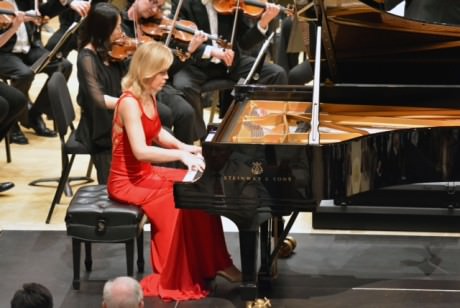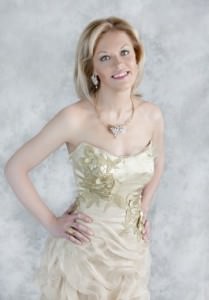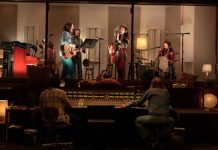Dreamy music about the memories of childhood and a virtuoso spin through the themes of one of history’s greatest operas are the stuff of which great piano recitals are made.

But it’s a mark of the special allure of international concert pianist Olga Kern that on the same evening she can also bring alive a bedrock of the piano repertoire that often seems “important” in music history while not necessarily affecting to the listener.
On Saturday evening, November 7, 2015 at the 92nd Street Y in New York City, Ms. Kern’s concert overflowed with a deeply meaningful performance of Beethoven’s landmark Waldstein Sonata that measured up in impact to Robert Schumann’s Kinderszenen (“Scenes of Childhood”) and a monster ride of piano virtuosity in Franz Liszt’s fantasy on themes from Mozart’s Don Giovanni.
The Waldstein Sonata – Beethoven’s Piano Sonata No. 21 in C major dedicated to a major patron of his – is one of Beethoven’s greatest but also potentially driest of his piano works. The first movement is highly percussive and indulges Beethoven’s habit of widely separating the two hands, running the risk of passages sounding bleak or abstract. The second movement and part of the third give an impression of meandering if played without a goal in mind.
Ms. Kern pulled the beauty out of the sonata by moving the line in lyrical ways. Two-measure sets of block chords that followed running passages were shaped into rolling hills of melody rather than sitting inert as piano sound of equal volume. In a number of passages in the first and last movement where the two hands mirror each other in motion and then go double-time in the same filigree, Ms. Kern avoided other pianists’ mistake of telegraphing the speed-up with accents and instead let the added forward motion grow organically out of the passage.
In the payoff part of the sonata alluded to by the sonata’s alternate nickname in Italian, “L’Aurora” (or “The Dawn”), Ms. Kern managed the trick of maintaining the songfulness of the melody, which requires a certain amount of pedaling to sustain and connect the notes, while not obscuring the articulation of simultaneous downward scales in the left hand. It’s exactly that counterbalancing of elements that makes the Waldstein “great” from an academic or musicological standpoint, and hearing this sonata performed in a way that equally appeals to both new and veteran listeners is very gratifying.
Far less intellectual and more directly emotional is Schumann’s Kinderszenen, which compiles 13 episodes of childhood memories of games, wonderment, storms, fears and impressions of the adults around them. The suite’s midpoint is the world-famous tune Traumerei or “Dreaming,” which like many of the other episodes Ms. Kern took with considerable rhythmic license or “rubato.”
Some very experienced concert-goers sitting behind me immediately compared her rubato concepts with those of a number of past performers of the suite. It’s important to note that Schumann did not consider Kinderszenen a suite for children. Rather it’s a set of adult remembrances about the experience of childhood, and it’s accepted that performers may vary their own approach over their performing careers as their own memory perceptions change. I can tell you that Ms. Kern’s performance had the same effect on the New York audience that a key passage in her season-opening performance with the Baltimore Symphony Orchestra had on the audience at The Music Center at Strathmore – a near-complete drop-off of that odd coughing habit that for whatever reason infects classical performances.
Probably nobody could have even heard a cough through Ms. Kern’s performance of Liszt’s bombastic fantasy on Don Giovanni, officially titled Réminiscences de Don Juan. One of the hardest pieces of piano music ever written – or in some other accountings the best piece of difficult music from the often wild and over-the-top Liszt – the 18-minute stemwinder cleverly laces in the opera’s signature “doomsday” rising D minor scale-work around episodes of frivolity and seduction.

Ms. Kern did some particularly delightful turns around Don Giovanni’s drinking song. Some transitions between phrases of the melody of his aria “La ci darem la mano” (“There we will give each other our hands”) amazingly presage 20th-century jazz harmonies and skipped buoyantly off the piano. Virtuoso scales in thirds – with the same hand playing in effect two simultaneous scales while the other hand accompanies below – passed without any evident stress. Ms. Kern has had this little number in her repertory ever since her victory in the 2001 Van Cliburn International Piano Competition, where she played it to wild applause, according to a recording that the competition released of all of her performances there.
Ever since then, Ms. Kern’s discography has included numerous composers’ works in the area of theme and variations. In Saturday night’s recital she hit this area with Felix Mendelssohn’s Variations sérieuses, a name that doesn’t quite capture the variety of moods in Mendelssohn’s distinctly inventive and fast-paced style. Ms. Kern’s wonderful articulation that reveals “the air between the notes” no matter how fast the music is moving was also on special display in three single-movement sonatas by the 18th-century Italian Domenico Scarlatti.
For encores she turned to her native Russia for an intense Prelude by Alexander Scriabin, a dance-worthy Hopak by Modest Mussorgsky, and the ever-popular Flight of the Bumblebee by Nikolai Rimsky-Korsakov.
Outside of New York, the name of the concert venue, the “92nd Street Y,” probably bears some explanation. Originally the Young Men’s Hebrew Association – a Jewish analogue to the YMCA – the 92nd Street Y has morphed into one of New York City’s leading cultural institutions (which of course is saying something). It presents not only music, dance and art but also literary readings, film screenings and numerous public affairs lectures and forums. Among its special series this season is 92Y Lyrics & Lyricists, including April performances of “Everything’s Coming Up Ethel: The Ethel Merman Songbook,” hosted by Ted Sperling, who recently headed the Library of Congress’ celebration of the music of Marvin Hamlisch. The variety of options in this one Upper East Side facility is simply remarkable, and more than well worth a visit.
Running Time: 2 hours and 10 minutes, with one 15-minute intermission.
Pianist Olga Kern performed on Saturday, November 7, 2015 at the Theresa L. Kaufmann Concert Hall of the 92nd Street Y – 1395 Lexington Avenue, in New York, NY. For all events at the 92nd Street Y, see their website. For Olga Kern’s upcoming concerts, see her concert schedule.
LINK
From Beethoven to Rachmaninoff to Billy Joel: An Interview with Superstar Pianist Olga Kern by David Rohde.




